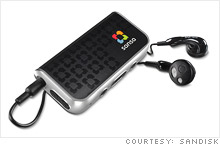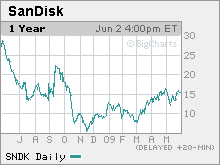SanDisk: We're No. 2!
The flash memory maker is second fiddle to Apple in MP3 players, but its Sansa creates buzz for its core product.
 |
| SanDisk's Sansa music players have taken a distant No. 2 position behind Apple's iPod. |

NEW YORK (Fortune) -- SanDisk CEO Eli Harari once plotted to dethrone the iPod with a series of "iDon't" ads a marketing campaign that cast Apple iPod users as fad-driven sheep, and promoted his company's Sansa media players as the smart alternative.
Some fads, however, don't pass. And in his sunny Silicon Valley conference room one recent morning, the founder and CEO of SanDisk admits what many music lovers have known for a long time: the iPod wars are over, and Apple (AAPL, Fortune 500) won.
"You can't out-iPod the iPod," Harari now admits.
Even so, one could argue that SanDisk (SNDK) won something too. Its Sansa (which remains a distant No. 2 to the iPod) helped prove that SanDisk's core product, flash memory, is the best storage technology for mobile gadgets such as the Sansa and iPod. This in turn sparked demand for SanDisk's patents, bringing the company a healthy stream of licensing and royalty revenue.
Flash memory chips are tiny, low-power storage chips found in digital camera memory cards, iPods, iPhones, BlackBerrys and pocket-size computers.
Harari's latest push is to promote the use of flash in low-end laptops. This week SanDisk showed off new storage products for the category, which along with smartphones represents a big opportunity for growth.
So is SanDisk sitting pretty? Not really. While Harari's flash evangelism has yielded some impressive results, it hasn't addressed his main challenge: SanDisk's core flash memory business is dizzyingly volatile. Because so many companies manufacture flash storage chips, and because the fast-evolving technology has a brief shelf life, the flash market lately has suffered gut-wrenching price swings and whipsawed SanDisk's stock price in its wake.
Take last holiday season. With the global economic collapse at full tilt, flash prices tumbled. SanDisk lost nearly half a billion dollars during the quarter, was forced to lay off workers and restructure partnerships, and even faced the prospect of a hostile takeover attempt from flash rival Samsung. (SanDisk's board rebuffed the bid, saying it undervalued the company and amounted to a cheap attempt to avoid renegotiating lucrative patent agreements.)
Samsung eventually withdrew its bid, and the two companies last week inked a new patent deal, boosting SanDisk stock to the $16 range -- still far from the $29 range where it traded a year ago.
The Sansa was supposed to insulate SanDisk from that kind of drama. Had Harari succeeded in building a strong competitor to the iPod and selling millions of high-end devices, that would have cushioned SanDisk's balance sheet from flash fluctuations.
Instead, the Sansa remains a niche low-end device selling for about $99, leaving the company as vulnerable as ever. (Another small victory: Sansa's No. 2 standing puts it above offerings from such worthy opponents as Microsoft (MSFT, Fortune 500) and Sony (SNE).)
Still, Harari isn't abandoning the music player business, he assured me during the visit to SanDisk headquarters in Milpitas, Calif. Though he hasn't made much headway against the iPod, the Sansa business gives SanDisk credibility with potential business partners. One of his latest gambits to create demand for flash is slotMusic, preloading music onto tiny memory cards and selling them at retail and record labels who are more open to dealing with a company that has the number two player on the market.
Yes, preloaded music sounds like a throwback to the 1990s in this era of online content delivery (think iTunes and Pandora) but don't look for Harari to concede defeat. Though the initiative is in its earliest stages, he says that some albums released in the flash format have seen nearly a third of sales go to the format. (He wouldn't say which albums.) And he still believes that consumers will eventually turn to memory cards to store their favorite movies and home videos, they way they did for digital photos. The result, of course, would be more demand for SanDisk technology.
A more promising growth area may be a new type of smart flash chip Harari is shopping to wireless carriers, who could it to better regulate the way phones behave on their networks. The chip could wake a phone up to download a large video during the middle of the night when data traffic is light, taking pressure off of the network. It could also keep mobile data more secure for corporate accounts, or install local languages on the phone.
For now, though, Harari is just glad flash memory prices have recovered from their winter free-fall.
"Price has gone up by 100% or so in the last three or four months, which is totally unprecedented in the history of flash memory," Harari notes. We'll see if his stock price can pull off the same trick. ![]()
-
 The retail giant tops the Fortune 500 for the second year in a row. Who else made the list? More
The retail giant tops the Fortune 500 for the second year in a row. Who else made the list? More -
 This group of companies is all about social networking to connect with their customers. More
This group of companies is all about social networking to connect with their customers. More -
 The fight over the cholesterol medication is keeping a generic version from hitting the market. More
The fight over the cholesterol medication is keeping a generic version from hitting the market. More -
 Bin Laden may be dead, but the terrorist group he led doesn't need his money. More
Bin Laden may be dead, but the terrorist group he led doesn't need his money. More -
 U.S. real estate might be a mess, but in other parts of the world, home prices are jumping. More
U.S. real estate might be a mess, but in other parts of the world, home prices are jumping. More -
 Libya's output is a fraction of global production, but it's crucial to the nation's economy. More
Libya's output is a fraction of global production, but it's crucial to the nation's economy. More -
 Once rates start to rise, things could get ugly fast for our neighbors to the north. More
Once rates start to rise, things could get ugly fast for our neighbors to the north. More







